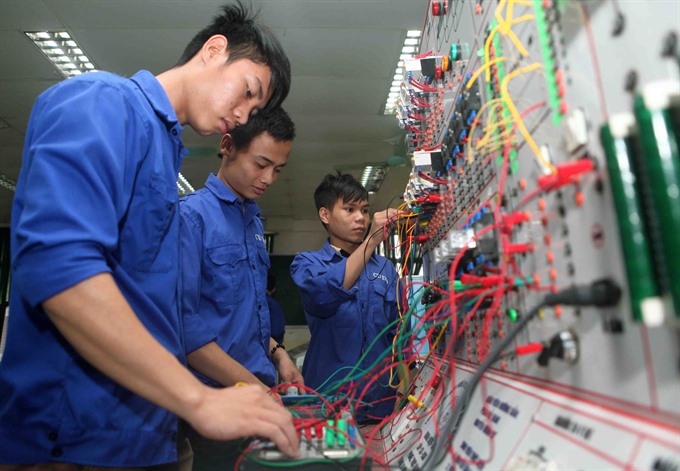 Economy
Economy

Việt Nam has been ranked 86th out of 118 countries in the annual Global Talent Competitiveness Index, which measures how countries grow, attract and retain talent.
 |
| Students at the Việt Nam – Korea Vocational College in Nghệ An Province’s Vinh City. According to the report, Việt Nam scores relatively better in global knowledge skills; by contrast, the country is struggling in terms of attracting talent and developing a pool of vocational and technical skills. – VNA/VNS Photo Thanh Tùng |
HCM CITY – Việt Nam has been ranked 86th out of 118 countries in the annual Global Talent Competitiveness Index, which measures how countries grow, attract and retain talent.
The study is done annually by INSEAD, one of the world’s leading business schools, the Human Capital Leadership Institute of Singapore and Switzerland-based workforce solutions provider Adecco Group.
The latest report explores the effects of technological changes on talent competitiveness, arguing that while jobs at all levels continue to be replaced by machines, technology is also creating new opportunities.
According to the report, Việt Nam scores relatively better in global knowledge skills (i.e. using the available higher skills to support the production of innovations and engage in entrepreneurship); by contrast, the country is struggling in terms of attracting talent and developing a pool of vocational and technical skills.
Andree Mangels, general director of Adecco Vietnam, said: “Việt Nam shows a mixed readiness in all aspects of the talent readiness for technology, although it is not surprising to find it well-positioned in entrepreneurial spirit as the country aims to have one million start-ups by 2020.
“In recent years, the young and enthusiastic Vietnamese entrepreneurs have introduced new technology and platforms that disrupted the traditional norms.
“However, for Việt Nam to achieve its ambitious goal of becoming a start-up nation in the next three years, there needs to be a stronger link between the classroom and the boardroom where education provides not only practical curriculum based on the economy’s needs, but also allows the learners to develop creativity and soft skills."
In the ranking of 118 countries this year, Switzerland and Singapore occupy the top spots. The UK and the US rank third and fourth respectively.
High ranking countries share key traits, including educational systems that meet the needs of the economy, employment policies that favour flexibility, mobility and entrepreneurship, and high connectedness of stakeholders in business and government.
Ilian Mihov, dean of INSEAD, said: “By focusing on ‘technology and talent’, this year’s report points at some of the most challenging issues that the world economy will face in the coming years.
“As the report underlines, the role of education will remain fundamental to reach this complex set of goals.”
Alain Dehaze, Adecco Group CEO, said: “The fast advance of automation and artificial intelligence is the source of the most disruptive changes of our time in the way we live and work. The transition will be rocky, so governments and business must act.
“Education system reforms are urgently needed to provide the right technical and people skills, and the ability to adapt to change.
“As a multi-career reality becomes the norm, workers must boost employability by committing to life-long learning. At the same time, employment policies must combine employers’ need for flexibility with social protection. Only by working together will we respond to the challenges, unleash the power of work and boost prosperity.”
Launched for the first time in 2013, the GTCI provides a wealth of data and analyses that helps decision makers develop talent strategies, overcome mismatches and be competitive in the global marketplace.
Việt Nam ranked 82nd out of 103 countries in the first edition and 82nd out of 109 last year. — VNS




